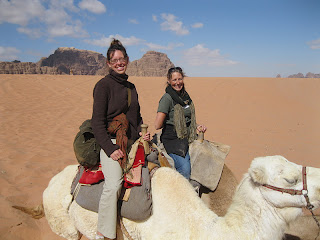I’ve been here in Amman, Jordan for just under three months now, with seven to go, and I have to say that one of the best things about the experience so far has been sharing it with the wonderful cohort that arrived when I did. There are five professors who were given Fulbright awards to Jordan this year: my colleagues Tess O’Neill and Angela Banks are both nursing faculty – Tess at the University of Jordan (UJ) with me and Angela at the Jordan University of Science and Technology (JUST) to the north of here. Two other professors, one at UJ and one at JUST, will be joining us in January to do 4 month grants. However, the majority of Fulbrighters here are actually students and that is the point of my post.
Until I became a Fulbrighter and had the chance to meet student Fulbrighters, I had a lot of misconceptions about the program. So, I’m presenting Five Things Students May Not Know about Becoming Student Fulbrighters.
1. There is a wide range of eligibility for student Fulbright applicants.
The students here come in all shapes and sizes. Some of the students here just graduated with their undergraduate degrees in May 2011. Others have master’s and/or other graduate degrees. Some have been in the working world for a year or more. A few are actually here working on their doctoral research. What they have in common is that they all wrote great applications and showed their commitment to the work or research they are doing now through the work they did as undergrads or grad students.
2. If a student is interested in learning a language that the US government considers vital, there is additional money available for that.
Saint Michael’s has two professors serving as Fulbrights this year: Professor Amy Werbel and me. We are both in countries with official languages (Chinese and Arabic) that the US government wishes more Americans understood. Therefore, the US government offers students selected for programs to these and other CLEA (critical language enhancement award) countries special grants in order to spend the first part of their time in-country working on their language skills. Here, that has meant that all the student researchers have been going to the Qasid Language Institute to study Arabic five days a week since we arrived. Most of them will finish next week and start their actual research.
3. Student Fulbrighters come from all kinds of majors and institutions.
There are students from large research institutions like Yale, Johns Hopkins, Princeton and Cornell here, but there are also students from small liberal colleges and big state universities There are plenty of students who made Arab studies and/or Arabic the focus of their studies, but there are plenty of political science and other liberal arts majors, as well as science majors like biology and geology. My friend Elizabeth has both a master’s and a law degree on top of her undergraduate degree.
 |
| These are the residents of Carpetland (their enormous, entirely carpeted apartment). They are my nearest Fulbright neighbors, and some of my all-time favorite people. Mike (Syracuse) is doing doctoral research on how legislative bodies affect decisions in a monarchy, and Luke (Yale) and Cooper (Kansas) are ETAs. |
4. There are different kinds of student Fulbright awards.
The traditional route to becoming a student Fulbrighter is to write a proposal describing a project that you would like to research and write about over the coming year. There are 18 student researchers in Jordan this year who followed that path. But there are also 10 English teaching assistants (ETAs). Like the scholars (my category) they are here for the school year (10 months) and have been assigned to all kinds of schools in the Amman area to help out in the English programs. Some work at the college level, some at secondary school; some work one-on-one and some lecture whole classes. The point is that both avenues ( student researcher and ETA) are possibilities for students interested in becoming Fulbrights.
5. Being a Fulbrighter is fun!
Of course, as in any cultural exchange experience things can be challenging, especially in the beginning. But from my observations, most of the Fulbrighters here are having an amazing experience. Most have chosen to live in apartments in groups of two or three, and they’re out exploring Jordan and sometimes the surrounding countries, on weekends and holidays. They’re also making a difference in the community. Some are tutoring Sundanese refugees in English, some are volunteering in Palestinian refugee camps, and some are doing additional unpaid internships in nongovernmental organizations that work on the issues they care about. They’re more independent than the average study abroad student, but there is also the wonderful built-in community provided by the rest of the Fulbrighters.
The bottom line, I’d say, is that anyone who is interested in doing research or teaching English in another country, whether they’re graduating this year or finished their degree years ago, should check out what Fulbright has to offer. There are three of us in the department who have had Fulbright grants (Mike Bosia, who was a student Fulbrighter in France, Jeff Ayres, who had a researcher grant in Canada, and me – first in Tanzania and now in Jordan), and I know we are all huge supporters of the Fulbright program. So remember : Fulbright is for students (and alumni) too!
For more information, contact Professor Reza Ramazani:
http://www.smcvt.edu/academics/honors/pbk/fellowships.asp
Or check out this website:



No comments:
Post a Comment